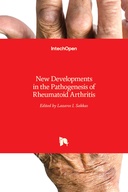Explore

New Developments in the Pathogenesis of Rheumatoid Arthritis
0 Ungluers have
Faved this Work
Login to Fave
The pathogenesis of rheumatoid arthritis (RA) is incompletely understood. HLA class II alleles and T cells have been implicated for many years. The discovery of anticitrullinated peptide antibodies (ACPAs), along with the effectiveness of biological treatments targeting cytokines, such as TNF-?, IL-6, and also T cells and B cells, reinforced the pathogenetic role of the respective factors. ACPAs, induced by cigarette smoking and periodontitis in individuals with HLA-DRB1 shared epitope, appear to be autoantigens that initiate the inflammatory immune response in RA. MicroRNAs, part of epigenetic mechanisms, which also include DNA methylation, and histone modification, as well as microbiota, the composition of microbes in body cavities, also appear to influence arthritis and are discussed in this book.
This book is included in DOAB.
Why read this book? Have your say.
You must be logged in to comment.
Rights Information
Are you the author or publisher of this work? If so, you can claim it as yours by registering as an Unglue.it rights holder.Downloads
This work has been downloaded 18 times via unglue.it ebook links.
- 18 - pdf (CC BY) at mts.intechopen.com.
Keywords
- thema EDItEUR::M Medicine and Nursing::MJ Clinical and internal medicine::MJC Diseases and disorders::MJCM Immunology
Links
DOI: 10.5772/63175Editions

